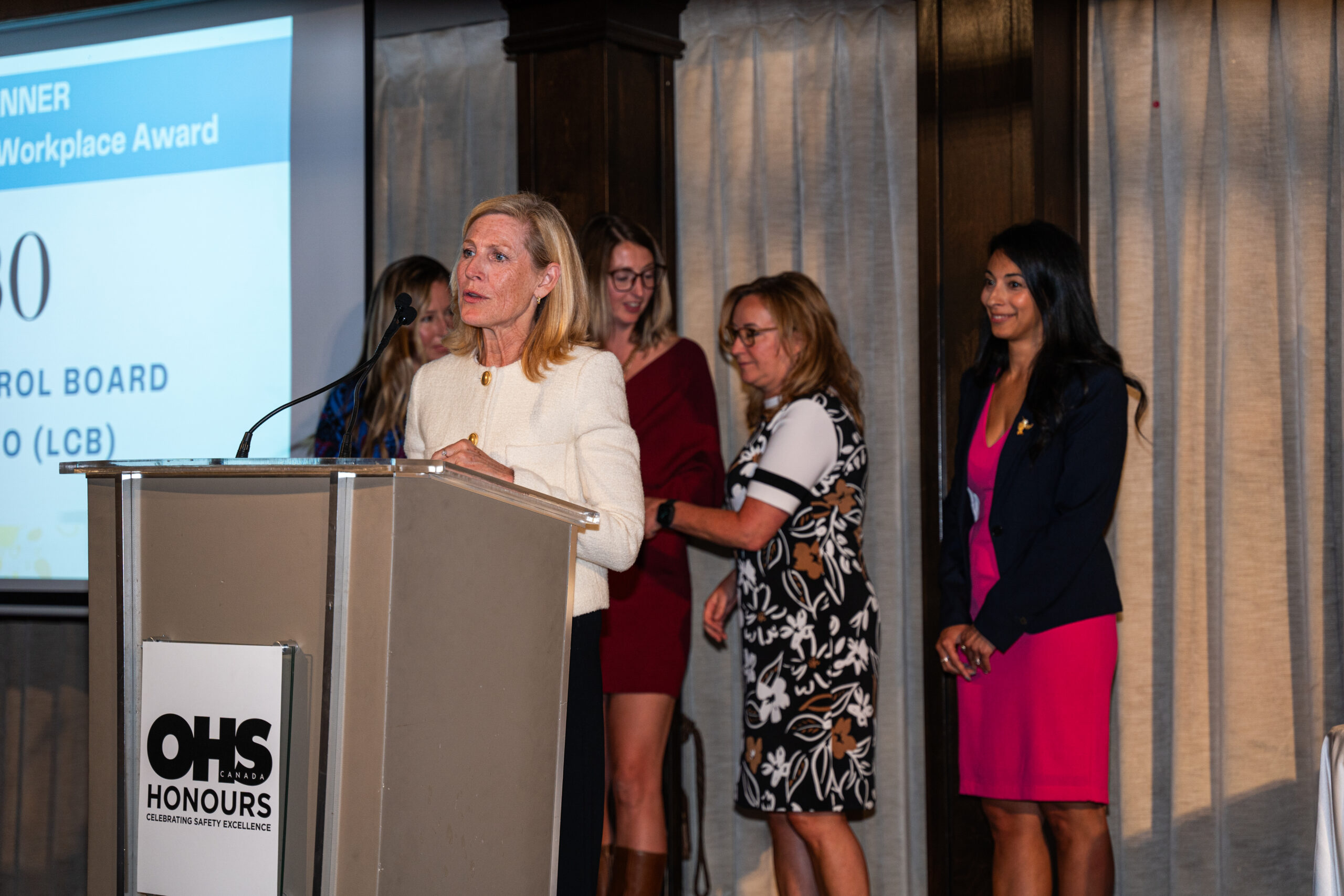
Uncorking wellness: LCBO expands focus from physical to psychological health amid pandemic
September 26, 2023
By
Todd Humber

The team from the LCBO at OHS Honours. Photo: OHS Canada
Psychologically Safe Workplace Award
Gold: Liquor Control Board of Ontario (LCBO)
Silver: Purolator
Silver: CRH Canada
Amidst the challenging backdrop of the COVID-19 pandemic and rising concerns about employee well-being, the Liquor Control Board of Ontario (LCBO) launched a Whole Person Health, Safety and Wellness Strategy in 2020.
The goal was to bring together various programs and offerings, including traditional health and safety, disability management, and well-being offerings together in a “holistic approach,” said Lilian Riad-Allen, senior director, workplace health, safety and wellness.
She noted that the pandemic provided a “seamless opportunity” to expand the traditional focus on physical health and safety to include psychological well-being. For those efforts, the LCBO was awarded the Gold Psychologically Safe Workplace Award for 2023 as part of OHS Honours.
Essential service
The LCBO, as an essential service in Ontario, remained fully operational throughout the pandemic.
“While we were taking every precaution to protect physical health and safety,” she said. “It was clear to us that we had to prioritize the psychological impact of this completely unprecedented and unknown situation.”
Riad-Allen said that although the retail stores remained open, the head office and other corporate operations shifted to a hybrid model of remote and in-person work, as operationally required. The organization also managed to maintain its regular health and safety protocols, despite the pandemic’s complications.
Riad-Allen noted that the LCBO’s emphasis on mental health wasn’t a reactive measure to a crisis. It had rolled out a program, called “Take Five,” aimed at encouraging employees to take breaks and focus on mental well-being, as well as several “bite-size, self-care opportunities.”
However, implementing a comprehensive program across multiple shifts and locations right across the province came with its challenges.
“Reaching everyone in our network of stores, warehouses, and offices can be difficult, so we needed to double-down on amplifying our messaging and overcommunicate,” Riad-Allen said.
Gaining management buy-in for the initiative was less of a hurdle – it was more about building on the foundation of what was in place. Riad-Allen said the LCBO had already committed to enhancing well-being before her arrival at the onset of the pandemic. The commitment was backed by a strong business case underpinned by “comprehensive research in the proactive management, prevention of psychological injury.”
The results speak for themselves: The LCBO has seen a significant reduction in mental health days taken by employees. Riad-Allen attributed the decrease to various factors including “changing the conversations managers were having with employees,” stigma reduction campaigns, and the enhancement of several programs and services aimed at psychological well-being.
Riad-Allen also spoke about the issue of escalated behaviours in customer-facing environments, which has been on the rise in many sectors.
“The world is in a bit of a hurting place, and we are seeing these escalations in behaviour,” she said. “We leaned in pretty heavily to our de-escalation focus, and providing de-escalation training to our frontline employees so that they work as safely within their control as possible.”

The team from the Liquor Control Board of Ontario. Photo courtesy LCBO.
Four main pillars of mental health
According to key performance indicators, the LCBO found that mental health injuries and leaves were on the rise, and also identified opportunities to address belonging as a key outcome of the organization’s People Strategy.
The roadmap it came up with for improvement is based on the Mental Health Commission of Canada’s National Standard for Psychological Health and Safety in the Workplace.
The strategy consists of four main pillars:
- Decreasing stigma and promoting awareness
- Enhancing the availability and access to resources
- Promoting effective stay-at-work and return-to-work options
- Continuous quality improvement
Tangible results
Since the strategy’s launch, the LCBO has undertaken numerous initiatives:
- Awareness campaigns, including a Fireside Chat with two Chief-level leaders, focused on reducing mental health stigma.
- A series of Mental Health Community of Practice sessions were held involving over 200 People Leaders, HR staff, and OPSEU Executive.
- Specialized workshops and programs have been deployed to prevent burnout and promote resiliency.
- 93% of People Leaders at the LCBO completed the Queen’s University Mental Health Leadership Program and 95% completed the Inclusive Leadership Program.
- Four Employee Resource Groups focusing on Women, 2SLGBTQ+ Persons, Persons with Disabilities, and Racialized Persons were activated with more than 2500 employees participating.

LCBO delivers acceptance speech at OHS Honours.